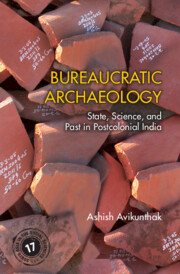Book contents
- Frontmatter
- Dedication
- Contents
- List of Figures
- Preface
- Acknowledgments
- Note on Transliteration
- List of Abbreviations
- 1 Anthropology of Archaeology
- 2 The Making of the Indus–Saraswati Civilization
- 3 Bureaucratic Hierarchy in the ASI
- 4 Spatial Formation of the Archaeological Field
- 5 Epistemological Formation of the Archaeological Site
- 6 Theory of Archaeological Excavation
- 7 Making of the Archaeological Artifact
- 8 Performance of Archaeological Representations
- 9 The Absent Excavation Reports
- Conclusion
- Bibliography
- Index
Preface
Published online by Cambridge University Press: 20 August 2021
- Frontmatter
- Dedication
- Contents
- List of Figures
- Preface
- Acknowledgments
- Note on Transliteration
- List of Abbreviations
- 1 Anthropology of Archaeology
- 2 The Making of the Indus–Saraswati Civilization
- 3 Bureaucratic Hierarchy in the ASI
- 4 Spatial Formation of the Archaeological Field
- 5 Epistemological Formation of the Archaeological Site
- 6 Theory of Archaeological Excavation
- 7 Making of the Archaeological Artifact
- 8 Performance of Archaeological Representations
- 9 The Absent Excavation Reports
- Conclusion
- Bibliography
- Index
Summary
Sixth of December 1992 was an exuberantly bright day in Bombay. Winter had arrived calmly. Sultry, humid weather had given way to a pleasant, cool climate. I was working since dawn at Chaitya Bhoomi—the memorial of Dr Bhimrao Ramji Ambedkar located at the edge of the Arabian Sea, in the heart of Bombay. It was the 36th death anniversary of Ambedkar—the principal architect of the Indian constitution and, particularly, the revered leader of the Dalits, the lowest of the oppressive Hindu caste hierarchy. Like every year, a few hundred thousand devoted pilgrims gathered to pay their respects to the departed leader at the site where his last rites were conducted in 1956. The leafy, middle-class neighborhood of Dadar was bustling with multitudes that had journeyed overnight in trains, buses, and even by foot from neighboring districts in Maharashtra, Gujarat, and Andhra Pradesh. It was late afternoon; I was cautiously negotiating the massive crowd along with Dalit activists—assisting visitors, providing information about restrooms, food stalls, and train and bus stations. Unexpectedly, an associate of mine nervously rushed toward me through the teeming masses. He aggressively pushed through the crowd and scurried close to me. Gasping for breath, his face was contorted with fearful anxiety. He frantically announced: “Babri Masjid has been demolished! They tore it down! It happened a couple of hours ago.” By the time all the activists regrouped, the enormous gathering was diminishing rapidly. The festive sprit that was stirring the energetic assembly had abruptly diffused. We sensed a palpable tension in the air. Those of us who were following the build-up of Hindu fundamentalists in the north Indian pilgrim town of Ayodhya over the past weeks were outraged. Not even in our wildest dream did we think that the government of India would allow the destruction of the disputed mosque. By late evening, news of communal violence erupting in different parts of the country started pouring in. At midnight, rioting began. Muslim business establishment and shops on Lamington Road, in south-central Bombay where my hostel was located, were systematically targeted, ransacked, and looted. By the morning of December 7, riots had spread to different parts of the city. Bombay was burning.
- Type
- Chapter
- Information
- Bureaucratic ArchaeologyState, Science, and Past in Postcolonial India, pp. xiii - xxviPublisher: Cambridge University PressPrint publication year: 2021



